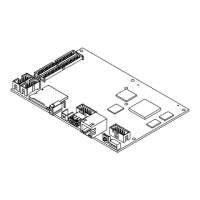NI sbRIO-960x/962x/963x OEM Instructions & Specifications 32 ni.com
result of differences in the signal path. Magnetic coupling is proportional
to the area between the two signal conductors. Electrical coupling is a
function of how much the electric field differs between the two conductors.
With this type of connection, the NI sbRIO device rejects both the
common-mode noise in the signal and the ground potential difference
between the signal source and the device ground.
Using Differential Connections for Floating Signal
Sources
It is important to connect the negative lead of a floating source to AI GND
(either directly or through a bias resistor). Otherwise, the source may float
out of the maximum working voltage range of the PGIA device and the
return erroneous data.
The easiest way to reference the source to AI GND is to connect the
positive side of the signal to AI+ and connect the negative side of the signal
to AI GND as well as to AI– without using resistors. This connection works
well for DC-coupled sources with low source impedance (less than 100 Ω).
Figure 24. Differential Connections for Floating Signal Sources without Bias Resistors
However, for larger source impedances, this connection leaves the DIFF
signal path significantly off balance. Noise that couples electrostatically
onto the positive line does not couple onto the negative line because it is
connected to ground. This noise appears as a differential mode signal
instead of a common-mode signal, and thus appears in your data. In this
case, instead of directly connecting the negative line to AI GND, connect
the negative line to AI GND through a resistor that is about 100 times the
equivalent source impedance. The resistor puts the signal path nearly in
balance, so that about the same amount of noise couples onto both
connections, yielding better rejection of electrostatically coupled noise.
This configuration does not load down the source (other than the very high
input impedance of the PGIA).
–
+
Inpedance
<100 Ω
AI GND
AI+
AI–
V
s
Floating
Signal
Source

